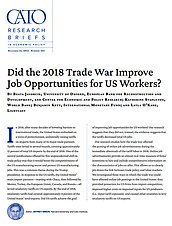Our research studies how the trade war affected the posting of online job advertisements during the immediate aftermath of the tariff hikes in 2018. Online job advertisements provide an almost real-time measure of firms’ intentions to hire and include comprehensive information on the characteristics of jobs on offer. This allows us to cleanly pin down the link between trade policy and labor markets. We investigated three ways in which the trade war could have affected online job postings in the United States: they provided protection for US firms from import competition, imposed higher costs on imported inputs for US producers (i.e., input tariff exposure), and caused other countries to levy retaliatory tariffs on US exports.
Our research finds that both the US tariffs and retaliatory tariffs had negative impacts on job postings. In contrast, the protectionist impact of tariffs on US jobs is indistinguishable from zero. A one-standard-deviation increase in input tariff exposure of a region led to a 3.6 percent decrease in online job postings, and a one-standard-deviation increase in retaliatory tariff exposure led to a 7.3 percent decrease in online job postings. These effects were concentrated in the second half of 2018 as the tariffs started to build up and led to an estimated combined effect of 137,000 fewer job postings. Just over two-thirds of this decline was due to the imported input tariffs and one-third due to retaliatory tariffs. The lost postings represent a 0.5 percent decrease in total US jobs in 2018 and a 0.9 percent decrease for the second half of the year. These results provide evidence of an overall negative impact of the trade war on the advertising of job openings, which could reflect either lower firm employment growth, firm downsizing, or closures.
The US tariffs and retaliatory tariffs reduced both higher-skilled and lower-skilled job postings. While imported input tariffs had a somewhat greater impact on lower-skilled jobs, retaliatory tariffs had a greater impact on higher-skilled jobs. The US tariffs, by raising costs for US industries that import inputs, most negatively affected job advertisements for farming, fishing, forestry, construction, and extraction jobs. Retaliatory tariffs negatively affected job advertisements for cleaning, maintenance and repair, and production workers. The two types of tariffs also had a negative impact on some services industries, including advertisements for managerial and professional positions. Imported input tariffs and retaliatory tariffs negatively affected both part-time and full-time jobs, with input tariffs having a greater impact on part-time jobs and retaliatory tariffs on full-time jobs.
The United States announced agricultural subsidies in July 2018 in response to retaliatory tariffs. Our analysis accounts for these subsidies and finds some evidence of a positive impact on job postings but no evidence that the subsidies were more effective in regions that were more exposed to the retaliatory tariffs.
Why does our research not find any positive effects of US tariffs on job postings? Such tariffs are typically justified on the grounds that they raise the price of imports, increasing the competitiveness of domestic firms and thus boosting domestic employment. However, three conditions are required for this to be the case. First, tariffs must increase domestic prices for the affected imports rather than foreign exporters absorbing the cost. Second, higher prices of the affected imports must result in consumers purchasing less of them. Third, consumers must substitute these imports with domestically produced varieties rather than with imports from other countries. Existing research suggests that the first two conditions generally held following the 2018 tariffs. However, the extent to which the third condition held is less clear. Some research has shown that the tariffs resulted in an increase in US imports from countries not subject to tariffs. Another possibility is that US producers expanded but did not hire more workers despite gaining market share. Alternatively, our short-run analysis may not have picked up longer-term positive effects.
NOTE
This research brief is based on Beata Javorcik et al., “Did the 2018 Trade War Improve Job Opportunities for US Workers?,” World Bank Group Policy Research Working Papers no. 10249, December 21, 2022.

